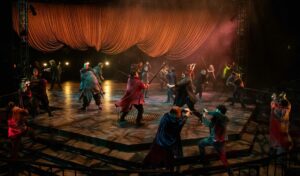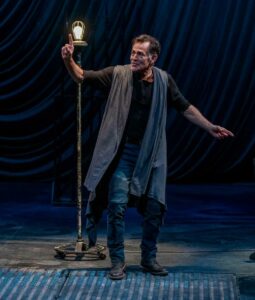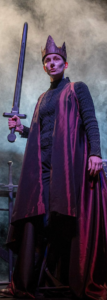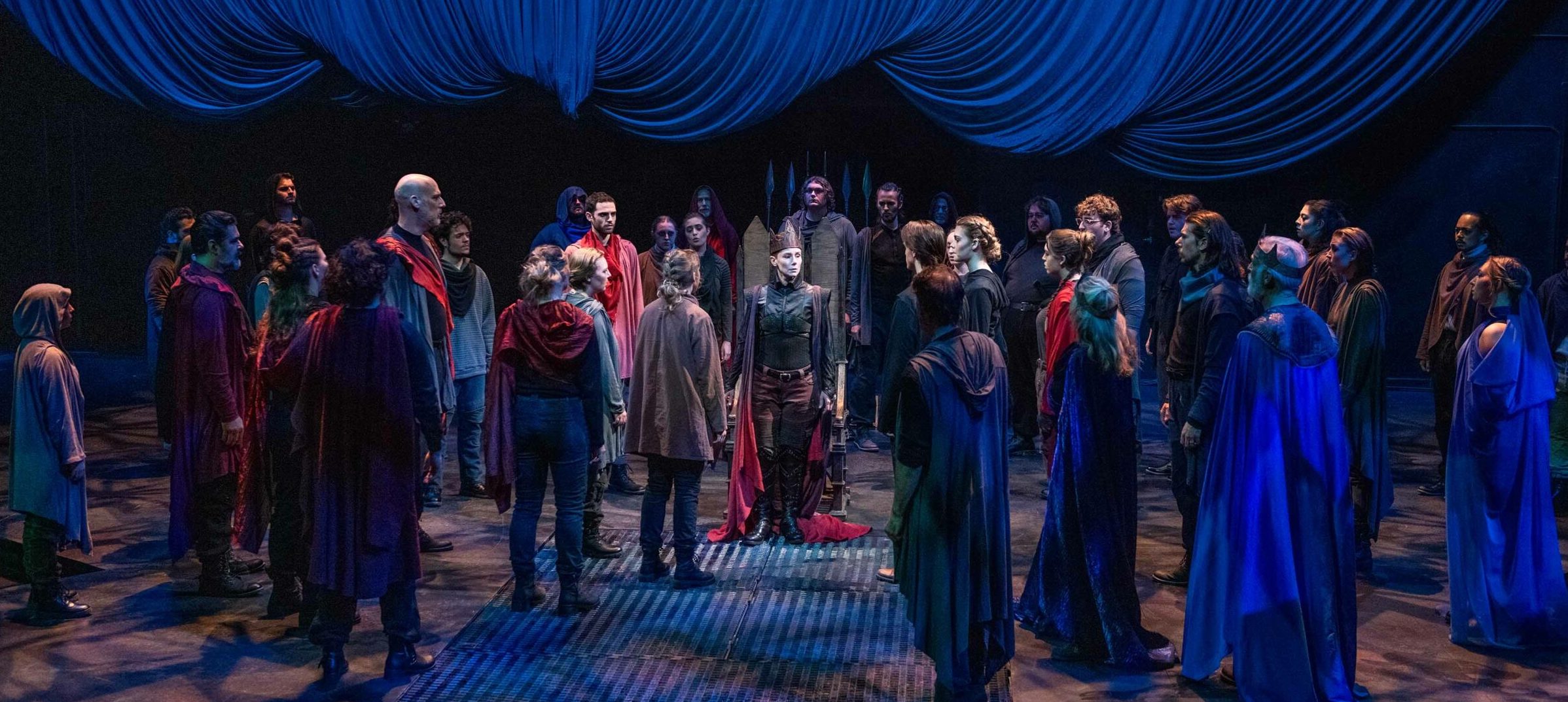Photos by Luis Escobar, Reflections Photography Studio
This production was scheduled February 16-25, 2024.
PCPA artistic director Mark Booher describes Shakespeare’s Henry V as “a kind of living treatise to the art of playmaking itself, and particularly the collaborative creative force through which player and audience co-create the story.” He has put his money where his mouth is, so to speak, choosing to direct the troupe’s second show of its 60th season himself and attempting to harness theatre magic to make imaginative connections between Henry V’s spectacle and its spectators.
And spectacle it is. Booher has rallied all PCPA resources at his disposal, leading a team of more than a hundred actors, designers, and crew members in shaping and reshaping a bare stage—indeed, the entire theatre space—to relay the story of one of England’s greatest warrior kings.
 There are curtains and catwalks and trapdoors and stairs that transform into battlements and battlefields, from an English throne room to the coast of France, thanks to ingenious lighting and scenic design by Cody Soper and Kevin Dudley, respectively. There are costumes by Klara Wilson that help delineate the allegiances of the 40-plus cast members, and props by Tim Hogan that effectively remind us that war doesn’t happen without weapons at hand. There are compelling scenes of carnage choreographed by fight director and resident artist George Walker; haunting original music numbers by PCPA musical director Michael Wilkins; and sound well-designed by Tony Angelini to bring the audience into scenes sometimes harmonious, sometimes strident.
There are curtains and catwalks and trapdoors and stairs that transform into battlements and battlefields, from an English throne room to the coast of France, thanks to ingenious lighting and scenic design by Cody Soper and Kevin Dudley, respectively. There are costumes by Klara Wilson that help delineate the allegiances of the 40-plus cast members, and props by Tim Hogan that effectively remind us that war doesn’t happen without weapons at hand. There are compelling scenes of carnage choreographed by fight director and resident artist George Walker; haunting original music numbers by PCPA musical director Michael Wilkins; and sound well-designed by Tony Angelini to bring the audience into scenes sometimes harmonious, sometimes strident.

Booher’s choice to embrace the “playmaking” aspect of this play is evident in his staging—incorporating a ghost light as a prop and using the catwalks above the stage to set a scene, for example. Both exposition and action are highly choreographed, reminding us throughout that this is an interpretation—a recitation, almost—of history, with cloaks and crowns and drumbeats and trumpets. This formality is broken only occasionally by individual actors who offer up sympathetic portrayals of men and women caught up in wars and marriages not of their own making.

Some of the company’s resident artists and senior staff members serve up some of the production’s most emotionally satisfying scenes: the arresting George Walker discussing warfare with impressive second-year student David Gary Perez, Jr.; the charming Molly Dobbs learning English from equally engaging first-year student Gillian Rains; the amusing Alexander Pimentel verbally sparring with the very articulate Don Stewart and winsome second-year student Nikolas Fawcett.
Guest artists Michael Tremblay (as Sir Thomas Erpingham and Charles VI of France) and Peter Hadres (as Bishop of Ely and Pistol)—always welcome additions to this company—are notable for lending both gravitas and bits of whimsy to their roles.
Andrew Philpot and Emily Trask, the Chorus and the King respectively, have been handed the heaviest assignments of all in this two-and-a-half-hour-plus tour de force. Their constant presence, whether physically on stage or off, unquestionably drives this production’s “creative force.” The Chorus must set the scenes for the audience, and Philpot clearly and reliably leads us where we need to go. Trask must inspire us, as Henry inspired his troops, to follow him into the fray, and while she has energy and focus to spare, along with the voice and physicality of youth, her strength lies in her intellectual interpretation of the text in weighing the complexities and moral choices of war.
Booher’s Henry V is an impressive and imaginative production, well-designed to display to the community the powerful playmaking resources of PCPA.
